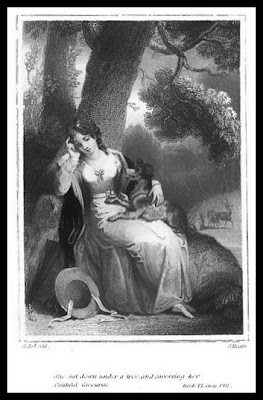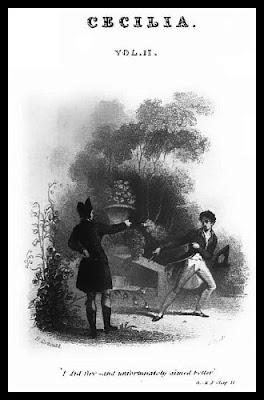 |
| Cecilia from Cecilia by Fanny Burney (1825) |
I recently read Fanny Burney's second novel, Cecilia. It was published on 12 June 1782 and, unlike her first novel, Evelina, it was written as a narrative and not as a series of letters. I have written this blog post to help me remember the characters and storyline.
The character list indicates what different people are like but does not say what happens. But beware: the section beginning ‘The story of an heiress’ is a summary of the story and gives away the entire plot!
The characters
The heroine:
Cecilia Beverley, the heroine, orphaned at a young age and heiress of her uncle’s fortune.
Cecilia’s three guardians:
Mr Harrel, the husband of her childhood friend, Priscilla, with whom she lives in high society in London.
Mr Briggs, a miser who jealously guards Cecilia’s fortune.
Mr Delvile, an extremely proud man who believes his family infinitely superior to everyone else.
Cecilia’s suitors:
Mr Monckton, Cecilia’s childhood friend and advisor, who, though already married to the ill-tempered Lady Margaret, hopes to marry Cecilia when his elderly wife dies.
Mr Arnott, Mrs Harrel’s brother, who is slavishly devoted to Cecilia.
Sir Robert Floyer, an extravagant gentleman who is the boon companion of Mr Harrel.
Mr Marriot, another gentleman suitor.
Lord Derford, son of Lord Ernolf.
Mr Belfield, a tradesman’s son whose mother and sister sacrificed everything so he could be brought up as a gentleman and whose vulgar mother believes him good enough for anybody.
Mortimer Delvile – the son of Cecilia's guardian, proud Mr Delvile.
Cecilia’s friends:
Mrs Charlton, an elderly lady who has been her friend since childhood and lives in Cecilia’s home county of Suffolk.
Mrs Harrel, her childhood friend, who lives in the fashionable world of London.
Henrietta Belfield, Mr Belfield’s sister.
Mrs Delvile, Cecilia's guardian's wife.
Other characters:
Mr Morrice, who ingratiates himself with people by being extremely obliging.
Mr Albany, an eccentric who goes about trying to make the rich and fashionable charitable.
The story of an heiress
Cecilia becomes heiress to her uncle’s fortune which she will inherit when she comes of age. However, the will stipulates that if she marries, her husband must take the Beverley family name or forfeit the fortune.
Her uncle has appointed three guardians: Mr Harrel, the husband of her school friend who lives in fashionable society; Mr Briggs, a miser, who jealously guards her fortune; and Mr Delvile, a very proud man who constantly complains about being lowered to accept the role alongside such inferior persons.
 |
| Cecilia and Mr Briggs from Cecilia by Fanny Burney (1825) |
Mr Monkton has been Cecilia’s friend and confidante for many years. He regrets having married a bad-tempered woman for her fortune and wants to marry Cecilia when his elderly wife dies.
The hollowness of fashionable life
Cecilia goes to live with the fashionable Harrels, but finds their way of life very shallow. Mr Harrel is under the influence of the extravagant Sir Robert Floyer whose attentions Cecilia finds objectionable.
The eccentric Mr Albany challenges Cecilia to think of others less fortunate than her. She is disgusted to find that Mr Harrel is refusing to pay his debt to Mrs Harris, whose husband is Mr Harrel’s creditor and whose family is in dire poverty.
Emotional blackmail
It soon becomes apparent that the Harrels are living beyond their means and Mr Harrel emotionally blackmails Cecilia for money. Mr Briggs will not advance her any money from her fortune and so she is forced to borrow from a money-lending Jew in order to give Mr Harrel what he needs.
Meanwhile, Cecilia meets Mr Mortimer Delvile who proves to be vastly different to his proud, obnoxious father. She falls in love with him and as the family stands in need of money, she assumes that her marriage would be welcome. Cecilia is befriended by Mrs Delvile who, though proud, is delighted with her intelligent and virtuous company.
A duel
An unfortunate incident occurs. Mr Belfield offers to escort her out of the theatre and she accepts, but Sir Robert Floyer objects. Cecilia refuses to change her mind and the two men argue. Her impassioned pleas that they might not fight lead people to believe that she has a decided preference for one gentleman or the other. Belfield is injured in the duel and has to hide in a poor part of town before he is fully recovered because he cannot afford to pay the doctor.
Both Cecilia and Mortimer try to help poor Mr Belfield. Cecilia befriends his sister Henrietta, but Mrs Belfield wrongfully assumes her concern is as a result of love, and berates her son for not soliciting Cecilia’s hand.
Cecilia has trouble convincing Mortimer that she is in love with neither Sir Robert nor Mr Belfield. She finally manages to persuade Sir Robert that she does not want to marry him, but then is pursued by Mr Marriot and by Lord Ernolf, who unsuccessfully seeks her hand for his son, Lord Derford.
 |
| Cecilia and Mortimer Delvile from Cecilia by Fanny Burney (1825) |
It happened one night at Vauxhall…
The Harrels’ affairs come to a head: Mr Harrel commits suicide in Vauxhall Gardens. Cecilia has given large amounts of money to him and they are all gone. Mr Monkton settles her debt with the money-lender which she agrees to repay when she comes of age. Cecilia goes to stay with Mrs Delvile, in London and then at Delvile Castle. Mortimer keeps his distance and Cecilia becomes confused and hurt.
A secret marriage is foiled
Mortimer eventually explains himself: he is in love with her, but his parents will not support the match because they would never countenance him giving up his name. He asks her to marry him immediately and secretly and trust that afterwards they will win his parents over. Cecilia is eventually persuaded, but is so afraid of going against the wishes of her dear friend Mrs Delvile that she immediately regrets agreeing.
She asks her friend Mr Monckton to tell Mortimer that she cannot marry him but he fails to track him down and she goes to London herself. Mortimer once more wins her over but the marriage ceremony is stopped by someone calling out during that fatal clause “Does anyone know of any reason why this couple cannot be joined?” and then running away.
A slave to duty
Mrs Delvile visits Cecilia and secures her promise that she will not marry her son against her wishes, but Mortimer is less willing to give up Cecilia and his mother is so angry that she becomes ill. Mr Delvile is vehemently opposed to the match in every way.
A new proposal
Mortimer then returns to Cecilia with the proposal, supported by his parents, that he should keep his name and she should forfeit her fortune and live off the £10,000 left her by her father. But alas, Cecilia had advanced most of this money to Mr Harrel – a fact that Mortimer did not know.
Mortimer now proposes that they survive on his own income and, having gained his mother’s support, Cecilia agrees reluctantly to a secret marriage, hoping to gain his father’s support afterwards. They marry in London and Mortimer immediately returns to his sick mother and Cecilia returns to Suffolk.
Another duel
But Mortimer finds that Mr Monckton has been maligning Cecilia in order to keep her unmarried until such time as he is free to marry her himself and, in a rage, he challenges him to a duel and shoots him.
 |
| The duel between Mr Monckton and Mortimer Delvile from Cecilia by Fanny Burney (1825) |
Whilst Mr Monckton lives, Mortimer is safe, but he agrees to take his mother abroad for her health.
Destitution and insanity
In the meantime, Cecilia is accused of changing her name and so is forced to renounce her inheritance. She leaves her house and returns to Mrs Charlton’s, but when that lady dies, she is left homeless.
Cecilia plans to travel to meet Mortimer, but fails to find him. Mr Delvile refuses her shelter. She goes to ask advice of Mr Belfield, but is discovered there by Mortimer, whose father has been maligning her character with Mr Monckton’s tales. Cecilia goes after Mortimer, terrified that he will fight another duel, but she fails to find him and her anxiety is so great that she becomes temporarily insane.
Happy ever after
Eventually Cecilia is rescued and, too proud to let his daughter-in-law stay in poverty, Mr Delvile welcomes her into his home. Cecilia recovers and is reunited with Mortimer. Her friend Henrietta and her disappointed suitor Mr Arnott find solace with each other. Virtue has its reward when Cecilia is made heiress to some Delvile family money.
Read about how Cecilia influenced Jane Austen's writing.
Another cheat guide: Regency History's guide to "Evelina" by Fanny Burney.
Rachel Knowles writes faith-based Regency romance and historical non-fiction. She has been sharing her research on this blog since 2011. Rachel lives in the beautiful Georgian seaside town of Weymouth, Dorset, on the south coast of England, with her husband, Andrew.
Find out more about Rachel's books and sign up for her newsletter here.If you have enjoyed this blog and want to encourage us and help us to keep making our research freely available, please buy us a virtual cup of coffee by clicking the button below.
Source:
Burney, Fanny, Cecilia or Memoirs of an Heiress (1825 version)


I have recently fallen in love with this era. So when I saw your blog I hopped over to check it out. I love it! I also went to Amazon.com and down loaded all three books of Cecilia for free! I am looking forward to reading them. Thank you.
ReplyDeleteDonna
I hope you enjoy it - I liked Evelina even better. :)
Delete